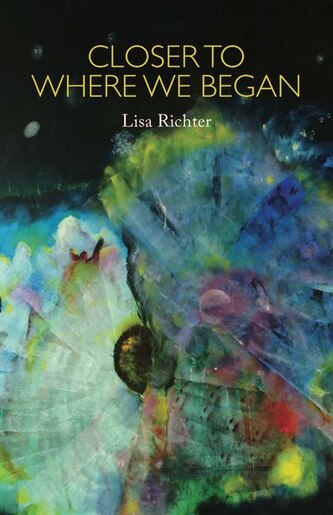Closer To Where We Began. Lisa Richter. Tightrope Books. Toronto, Ontario. 2017.

Lisa Richter's dreamy Closer To Where We Began starts off with a quote from Sharon Olds, a poet Today's book of poetry has nothing but admiration for. Who a poet reads, is influenced by, quotes often, tells us much about where a poet wants to go, where their head is at. Richter's would seem to be firmly in the right place.
sometimes I can feel it, the way we are
pouring slowly toward a curve and around it
through something dark and soft, and we are bound
to each other.
- Sharon Olds
These poems feel as though you are inside of Richter's dreamscape and looking out onto a horizon of her making where "pomegranate juice light" illuminates the darker corners.
Today's book of poetry doesn't want to dance into dangerous territory when he says that only a woman would have written these poems. Perhaps women see the world through a different coloured prism? I know my almost perfect wife and I often disagree on the colour of a particular object. We are looking at the same thing but not seeing the same thing. Richter's Closer To Where We Begin looks at our world through lucid dreams and then she writes it all down.
Ouroboros
The year I was born, my great-grandmother
died. Skimming sides and glances, we conducted
love through our bones, memory
and foreshadowing encoded in the rings
of skipped stones across drumskin-smooth
water. She wore cat's-eye glasses and a daffodil
grin, paisley polyester and wind-puffed
canvas smocks.
Her face gleamed a heavy moon white, pock-
marked with the scars of long-dried seas--
lips of calcified salt, teeth of fossilized
spine, jaw-bone, femur. They say the marbles
rolled in her head, that there, the mind lounged
and lolled. Deep in the quarry of her body
the sun-stroked fields of Belarus sang, drowning
out the traffic of Outremont life.
Once, as she danced around the Passover
table, voluminous breasts swinging, hips bumping
the backs of chairs, her feet pushed the sweet
air and she soared around the room. I too felt
the pull of Bubbe's circular laps, slipped
from my mother's arms, floated
up to join her (it took three men
over an hour to get us down).
This is how we were meant to be
acquainted: her life at the tip
of the snake's tail, mine at the apex
of its open mouth.
...
Richter doesn't just see light through different prisms, she drinks it, absorbs it. She carries light around in a secret satchel, lets it seep into these poems like a "hash-fogged" thought.
Richter's dream state includes nightmares, the horrors of systemic hatred, war, religious conflict and so on. Sometimes the ghosts of dead children infect the light. These poems cover a lot of geography from Gaza to a rockabilly Chuck Berry, Lisa Richter lights it all up.
Gaza under Siege
You are house-sitting--a two-bedroom, air-
conditioned townhouse in Liberty Village, watering
aloe and spider monkey, serving two cups
of dry food a day to a fat white cat named Luca.
Stackable washer and dryer in the hall closet.
You slide open the cool, mirrored doors while
your clothes are kept from shrinking. No laundromat
trips, duffle bag of clothes over your shoulder,
just the nearby shudder of brushed steel machines
doing the labour, while you sit with your laptop
and a glass of cheap Malbec on a couch that's not
yours. King-sized bed in the master too hard, you sleep
on the queen in the guest room: not as firm, just
right. Goldilocks with a key fob, helping yourself
to steel-cut oats and memory foam sleep.
Meanwhile, the death toll of children in Gaza
reaches five hundred. You brush the long-haired cat, sip
your wine, swirling it until it reads as diluted
blood. Read the horror. Remember the sound
of the fireworks in Tel Aviv, on Yom Ha'atzmaut,
you were told could just easily have been
rockets. Long ago, at Hebrew day school, you celebrated
that day in May with blue-and-white-frosted cake,
how proud you were that Eretz Yisrael was the same
age as your parents. Meanwhile, in Gaza, bodies
and the city's wood and metal bones amass
in baroque jumble, Biblical disarray. On Facebook
you scroll through feeds of loathing, fear culled
from recipes that you once followed -- they brought
this onto themselves, they hate us more than they love
their own -- morsels you can no longer keep down,
no longer digestible nor kosher, which never mattered
before, but for some reason, matters now.
...
Our morning reading here at the Today's book of poetry offices was a bit overshadowed and subdued by my own sad, slow state. Today's book of poetry has been away for a few days to attend the funeral of my Uncle Sparky. Don't think Don "Sparky" Brault ever read much poetry and I know he was a deeply flawed man but he showed great kindness to my mother and I when I was very young. And he always treated me like he was happy to see me.
Today's book of poetry's big family is shrinking. In the last five or six months I've had two Aunts, Alice and Dora, and two Uncles, Dan and Sparky - leave this mortal coil. The rest of my Aunts and Uncles must be checking each other out to see who's next.
Lisa Richter's Closer To Where We Began world was enough to lift me and my minions out of our shadowy morning, these poems lit the place up.
How to Write a Hanukkah Poem
1.
Choose your preferred spelling of Hanukkah,
from the seven or eight available. Assemble
your arsenal: dreidls your father would show off
by spinning upside down. Latkes. Paper towels
to soak up the grease from latkes, paper bags
to soak up the grease from the paper towels, candles
that will melt and harden in the menorah, scraped
out next year with the tip of a steak knife, hard flakes
of coloured wax. Whatever you do, don't call
the menorah the hanukkiah, the proper word
you learned long ago in Hebrew school:
it will sound too specific, too accurate, above-
board. You will alienate most people, or worse,
charm them with your exoticness.
2.
Subvert. Make dreidl games dirty. Strip off clothing
if the dreidl lands on the letter gimmel. Truth
is daring. Make "space latkes" that will get you
higher than the most mystical of cabbalists,
taste the colours of candles bursting with sweet
liquid. Snort lines off pages of the Talmud. Forget
about inviting distant relatives who always tell
you what they prefer to do. None of this will give
you joy, only stories to display like dark ribbons
on your chest, a catalogue of scars for the shocked listener.
3.
Write. Invoke the light. Invoke the hand that holds
the shamash, moving from light to light. Invoke
small haloes around each candle, pancake moons
around the heads of gaunt-faced Russian icons.
Invoke more light, the light that ushers you through
December's dark, the light that leaves nothing
in its wake that is cold or unkind.
...
Richter has a sharp, laser type tongue, even if it often resides in her cheek. Or at least that's what Closer To Where We Began leads Today's book of poetry to believe.
We never get tired of smart here at Today's book of poetry. We never get tired of new modes of illumination. Lisa Richter lit up the room.
Lisa Richter
Photo: Matthew Burpee
ABOUT THE AUTHOR
Lisa Richter‘s poetry has appeared in The Malahat Review, The Puritan, Literary Review of Canada, The Toronto Quarterly, Crab Creek Review, among other journals and anthologies. She was longlisted for the CBC Poetry Prize in 2015, and won first place in CV2 Magazine’s 2-Day Poem Contest in 2017. Closer to Where We Began is her first collection of poetry. She lives, writes, and teaches English as a Second Language in Toronto.BLURBS
“Lisa Richter weaves time and place with grace and expertise throughout the poems in this her first collection, Closer to Where We Began. Sensual, delicate yet biting, these poems sweep forward and back with energy and insight proving ‘the heart is a finite muscle of blood and music.’ By following the rhythm of each poem’s unfolding we are led to a ‘deeper quiet.’ A rich and resonant book.”— - - Catherine Graham, author of Her Red Hair Rises with the Wings of Insects
‘”Invoke the light…” writes Lisa Richter, ‘the light that leaves nothing / in its wake that is cold or unkind.’ With a richness in metaphor and a clarity of vision, Richter deftly travels the reader through seasonal tapestries of nature, across many identities, into many cities, and inside the bounds of family. Yet losses, and the world’s coldness and cruelty are not ignored, but rather, their pains and truths explored poetically: ‘the tongue finds its muse in the most sour of ripenings.’ The confidence and tenderness of Richter’s voice, and her mastery of form, makes Closer to Where We Began a rich and compelling read.”
- Maureen Hynes, author of The Poison Colour
- Robin Richardson, author of Knife Throwing Through Self-Hypnosis
614
DISCLAIMERS
Poems cited here are assumed to be under copyright by the poet and/or publisher. They are shown here for publicity and review purposes. For any other kind of re-use of these poems, please contact the listed publishers for permission.
We here at TBOP are technically deficient and rely on our bashful Milo to fix everything. We received notice from Google that we were using "cookies"
and that for our readers in Europe there had to be notification of the use of those "cookies. Please be aware that TBOP may employ the use of some "cookies" (whatever they are) and you should take that into consideration.







